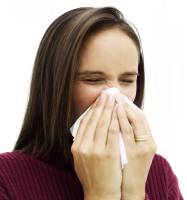 |
||||
Allergy Natural RemediesAllergy natural remedies and home remedies for allergies include the use of herbs, homeopathy, nutritional supplements, and aromatherapy.
 An allergic reaction occurs when your immune system misinterprets a foreign but normally harmless substance (such as pollen, grass, certain food, etc.) as a harmful invader.
The immune system responds to this perceived threat, known as an allergen, by producing proteins known as IgE antibodies. Normally, in the case of an actual
threat such as a flu virus, these antibodies work to protect you from these virus that could make you sick or cause an infection. However, in the case of an
allergy, these antibodies look upon the allergen as harmful (even though it is not) and triggers the release of histamines and other substances that cause
allergy symptoms.
Histamines produce various bodily reactions that involve your skin, sinuses, airways or digestive system, such as respiratory and nasal congestion, increased mucus
production, skin rashes and welts, diarrhea, and headache.
Common allergens can be found in the environment, such as pollen, dust, mold, pet dander, and so on. Allergens can also be found in food, particularly peanuts, wheat,
soy, fish, shellfish, eggs and milk. Usually, when the environmental allergens are removed, the allergic symptoms go away. However, if the allergens are not removed,
the immune system will continue to produce histamines and the allergic symptoms will worsen which may result in chronic
sinusitis (sinus infection).
It remains unclear as to why some people develop allergic reaction to certain allergens while others are unaffected. One possible reason may be due to genetics. Another
reason may be due to stress and a compromised immune system.
An allergic reaction occurs when your immune system misinterprets a foreign but normally harmless substance (such as pollen, grass, certain food, etc.) as a harmful invader.
The immune system responds to this perceived threat, known as an allergen, by producing proteins known as IgE antibodies. Normally, in the case of an actual
threat such as a flu virus, these antibodies work to protect you from these virus that could make you sick or cause an infection. However, in the case of an
allergy, these antibodies look upon the allergen as harmful (even though it is not) and triggers the release of histamines and other substances that cause
allergy symptoms.
Histamines produce various bodily reactions that involve your skin, sinuses, airways or digestive system, such as respiratory and nasal congestion, increased mucus
production, skin rashes and welts, diarrhea, and headache.
Common allergens can be found in the environment, such as pollen, dust, mold, pet dander, and so on. Allergens can also be found in food, particularly peanuts, wheat,
soy, fish, shellfish, eggs and milk. Usually, when the environmental allergens are removed, the allergic symptoms go away. However, if the allergens are not removed,
the immune system will continue to produce histamines and the allergic symptoms will worsen which may result in chronic
sinusitis (sinus infection).
It remains unclear as to why some people develop allergic reaction to certain allergens while others are unaffected. One possible reason may be due to genetics. Another
reason may be due to stress and a compromised immune system.
Symptoms of AllergiesJust as we may have allergic reactions to different types of allergens, the symptoms of allergies are also different depending on the type of allergens causing the reaction. For airborne allergens such as pollen (reactions to pollen are often called hay fever), the symptoms are usually:
Allergy Natural RemediesConventional medications for allergies can include over-the-counter or prescription medications in the form of oral medications, nasal sprays or eyedrops. Oral allergy medications include corticosteroids, antihistamines, and decongestants. For severe allergies or allergies not relieved by other treatment, some people go for allergy shots (immunotherapy). These conventional treatments can reduce allergy symptoms but can also have side effects such as drowsiness, headache, and dry mouth. Allergy natural remedies involve the use of herbal remedies and nutritional supplements, as well as homeopathic remedies and aromatherapy. These are milder and more gentle on our bodies. However, natural allergy remedies may take longer to be effective, so if you are suffering from seasonal allergies such as hay fever, be sure to start taking allergy natural remedies one or two months before the allergy season starts.Allergy Natural Remedies - Nutritional Supplements for AllergiesNutritional supplements are effective allergy natural remedies that can help alleviate allergy symptoms. In particular, consider the following if you have allergies:
Allergy Natural Remedies - Herbal Remedies for AllergiesHerbs can be used as allergy natural remedies to lessen the symptoms of allergies as well. The most common herbal remedies for allergies include:
Allergy Natural Remedies - Homeopathic Remedies for AllergiesHomeopathic remedies are effective allergy natural remedies as well. They usually can provide fast relief. For a remedy to work, you need to select the remedy that most closely matches the symptoms. Use a lower potency (6X, 6C, 12X, 12C, 30X, or 30C) and follow the instructions printed on the label. Remedies effective for allergies include:
Allergy Natural Remedies - Aromatherapy** If you suffer from plant allergies such as hay fever, use essential plant oils cautiously. ** Several essential oils can loosen mucus. They include:
Related Topics Natural Sinus Infection Remedies Natural Cures for Hives References Balch and Stengler, Prescription for Natural Cures, (John Wiley & Sons, Inc., 2004) The Editors of Prevention Health Books, Prevention's Healing with Vitamins (Rodale Books, 1998) J.A. Duke, The Green Pharmacy Herbal Handbook. (St. Martin's Paperback, 2002) MayoClinic.com (http://www.mayoclinic.com) University of Maryland Medical Center - Quercetin (http://www.umm.edu/altmed/articles/quercetin-000322.htm) TOP of Allergy Natural Remedies |
|
|||
|
Then why not use the button below, to add us to your favorite bookmarking service? |
||||
|
| Contact Us | Privacy Policy | It is not intended to replace the advice and treatment of a professional medical practitioner. |
||||
|
| ||||
